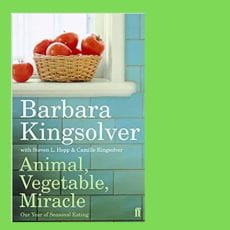Animal, Vegetable, Miracle by Barbara Kingsolver

I’ve read a lot of Kingsolver recently. Demon Copperhead for one book club and Unsheltered for another and now Animal, Vegetable, Miracle which I loved. In fact I am just going to list all the things that I loved.
- Her choice of vegetables. If I had to choose key vegetables I would choose the same as Kingsolver chose. As I write this in July and we are sinking under a mound of courgettes and almost eating them at every mealtime. I am going to chop some up and put them in the freezer for soups in winter but I really couldn’t face the amount of time she spent in the kitchen in August preserving all that food.
- The idea that we can decide how we feel about cooking at the end of the day. Is it a mind-numbing chore or is it an act of love to bring everyone together around something that is good for us but also provides a social occasion for a family. I choose an act of love and health.
- She’s funny. I am still chuckling at the thought that we ask our young people to delay having sex, wait until they are a bit older, but we can’t wait for tomato season. We buy them all year round and eat them even when they are tasteless winter blobs. In fact they are like that in the summer if you buy them from a supermarket. Or, how about when she had to teach her turkeys how to have sex because it has been bred out of them.
- Living on what you can get locally. Kingsolver and family had animals for eating. It requires that we research local suppliers and then buy from them. I love the idea that our money can be put to good use within our community. Farmers were having a hard time when she wrote the book in 2008 but they are having an even harder time in 2023. Climate change is happening and affects what and how we grow.
- “We all may have some hungry months ahead of us, even hungry years, when a warmed-up globe changes the rules of a game we smugly thought we’d already aced.” p325
- Secretly, I hanker after doing the same thing. I would have to be a lot more organised and think more carefully about how much of each thing to grow but I do have the space and some know-how. I would start in May and I would really have to think about winter because I don’t have the space to freeze everything to keep us going all winter but I do have a polytunnel.
Were there things I wasn’t so sure about in the book? Yes. Her daughters never appeared to argue about wanting things they couldn’t have – perhaps they had been talking about this way of living for several years so they had bought in to the idea. They do come over as a rather perfect family. But, how do you live without lemons? I have grown 4 this year, all tiny. Not exactly abundance so the things we would have to go without might be quite a lot. I don’t eat many bananas so that isn’t a problem. Maybe I ought to start growing lemons a little more seriously.
This book is one woman and her family’s journey. It isn’t mine or yours and so I think if we take the principles we can all have a go. It’s just that some of us might have more disagreements (!) along the way.